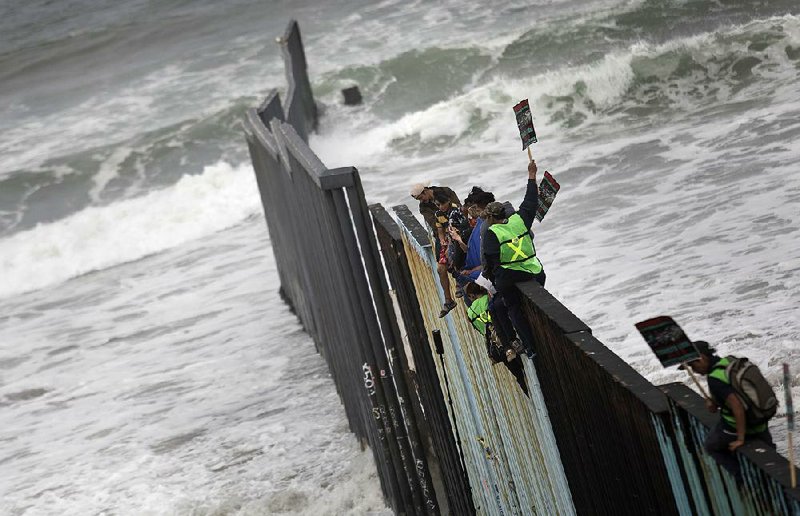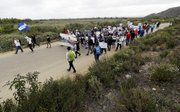SAN DIEGO -- A group of Central Americans who journeyed to the U.S. border in a caravan resolved to turn themselves in and ask for asylum Sunday -- only to have U.S. immigration officials announce that the San Diego crossing was already at capacity and wouldn't immediately accept them.
Nearly 200 asylum seekers, many traveling with children, had decided to apply for protection at the crossing at San Diego, organizers said.
Wearing white armbands to identify themselves, the first 50 people tried to enter the San Ysidro port of entry in the afternoon, at the end of an expedition that started more than a month ago and 2,500 miles south of the U.S.
But even before the asylum seekers arrived, U.S. Customs and Border Protection said the crossing could take in additional people only as space and resources become available. The agency has said the port can hold about 300 people temporarily.
"At this time, we have reached capacity at the San Ysidro port of entry for CBP officers to be able to bring additional persons traveling without appropriate entry documentation into the port of entry for processing," Commissioner Kevin McAleenan said in a statement.
Despite the news, about 200 migrants still started walking toward the port.
As the sun set in Tijuana, no one from the group had been allowed on the U.S. side or processed by border officials, according to organizers accompanying them. They were being permitted to wait in passageways until room became available, according to Irineo Mujica, one of the organizers of Pueblo Sin Fronteras, a transnational group that organized the caravan.
Another 50 prepared to camp outside a gate on the Mexican side of the border crossing with backpacks and blankets, hoping to get their turn today.
Alex Mensing, project coordinator for Pueblo Sin Fronteras, told reporters that the migrants would remain at the gate, overnight if necessary, until border officials once again had the capacity to process them.
"We wish that the United States government were capable of accepting more than a few hundred asylum seekers at any given time, since we can certainly pick up more than a 1,000 people in an ICE raid on any given day," he said, referring to Immigration and Customs Enforcement, an arm of the Homeland Security Department.
The migrants had made their way north by foot, freight train and bus over the past month, many of them saying they feared for their lives in their home countries.
Earlier Sunday, the migrants boarded five old school buses to attend a rally at a Pacific Ocean beach, with supporters gathering on both sides of the border fence and some climbing the barrier to sit or to wave signs.
In the oceanfront park Sunday morning, before the larger group arrived, four migrant couples were married in a small ceremony attended by several of their friends.
The nuptials underscored one of the migrants' greatest fears now that they've reached the border: having their families torn apart once they turn themselves over to U.S. immigration authorities.
"We're fighting so that people who already have kids together are recognized as a family," said Emma Lozano, a pastor for Familia Latina Unida, an immigrant-rights group based in Chicago, who performed the wedding ceremonies. The marriage certificate is "a legal document that shows they are a family, so that they don't divide the family."
The Martinez family had gathered by the beach in Tijuana early Sunday morning, knowing that they would be one of the many to seek asylum.
"I hope that the immigration agents take into account that walking from Chiapas [in southern Mexico] to here, and fleeing from our countries, is punishment enough," said Maria Magdalena Iraeta Martinez, 47, of El Salvador, whose son and daughter got married to their partners.
Five years ago, Martinez said, her family had been encircled in their home by armed members of the MS-13 gang. The gang members had attempted to recruit her son, William Rafael Caranza Martinez, now 25, but he had refused to join. Armed men entered the house early in the morning, escorted all of the extended family outside, and threw them to the ground at gunpoint, she said.
The family fled to Guatemala and lived for several years in southern Mexico, but they continued to receive gang threats. Nine members of the family planned to turn themselves in at the border checkpoint.
"It's been a nightmare that follows me day and night, and even though I wish it was over, it keeps coming back," she said of the threats she received. "With the blessing of God and the Virgin Mary, I'm going to get asylum."
JOURNEY TO THE U.S.
The monthlong odyssey began March 25 in Tapachula, on Mexico's border with Guatemala, following a familiar pattern. Groups of a few hundred migrants have traveled north together through Mexico as a "caravan" several times in recent years, their numbers providing protection from thieves, extortionists and rapists.
This time, however, the caravan quickly grew to upward of 1,200 people -- far larger than its organizers had anticipated.
And there was another crucial difference: While past migrations had barely registered outside Mexico, this one caught the eye of President Donald Trump. In early April, Trump unleashed a barrage of tweets warning of the supposed threats the caravan posed to the security and sovereignty of the United States and accusing Mexico of doing little to stop illegal migration.
[PRESIDENT TRUMP: Timeline, appointments, executive orders + guide to actions in first year]
Undeterred, the caravan continued north in a herky-jerky manner, its participants traveling by any means possible, including on foot and by hitchhiking, but also atop freight trains and buses. Hundreds dropped out along the way, choosing to travel on their own or stay in Mexico.
With the migrants on the doorstep of the United States, Trump, in a tweet, vowed "not to let these large Caravans of people into our Country." Attorney General Jeff Sessions called the caravan "a deliberate attempt to undermine our laws and overwhelm our system."
Administration officials and their allies claim that asylum fraud is growing and that many who seek it are coached on how to do so.
"To anyone that is associated with this caravan, Think Before You Act," Rodney Scott, chief agent in San Diego for the Border Patrol, said in a statement. "If anyone has encouraged you to illegally enter the United States, or make any false statements to U.S. government officials, they are giving you bad advice and they are placing you and your family at risk."
But the Trump administration's aggressive response to the caravan has only seemed to embolden its organizers and mobilize supporters. In recent days, scores of volunteer immigration lawyers and paralegals -- from San Diego, Los Angeles, San Francisco, Las Vegas and elsewhere -- have converged on Tijuana to help.
On Friday and Saturday, the lawyers met migrants individually to review their asylum requests to enter the United States.
To qualify, applicants must prove they have been persecuted or fear persecution based on their race, religion, nationality, political belief or membership in a particular group.
Those deemed to have solid claims of persecution were encouraged to apply for asylum Sunday. The lawyers advised others to seek protection in Mexico or elsewhere in Latin America.
PROVING PERSECUTION
People who request protection at a U.S. entry point must first be referred to an asylum officer for a screening, known as a credible-fear interview. If the officer finds that an applicant has a chance of proving fear of persecution, the person must then present his case before a judge.
While awaiting their court dates, applicants could be released, albeit with an ankle-bracelet monitor. Those who do not pass their interviews, or who do not qualify for one, could face months in detention and eventual deportation.
"We're only sending people who we think will pass the credible-fear interview," said Nicole Ramos, an attorney working on behalf of caravan members.
The Trump administration has sought to make it more difficult to apply for and to receive asylum, and immigrants' advocates say that the number of asylum seekers released while their cases are pending has plunged since Trump took office.
A lawsuit filed in March by the American Civil Liberties Union and other groups accused the Trump administration of detaining asylum seekers to deter them and others from seeking sanctuary.
Ramos said she feared that with all the international attention on the caravan, the White House might be even less inclined to show mercy, even to those who pass their credible-fear interviews.
"They could use it as an opportunity to make an example out of people," she said. "They're assuming that people are breaking the law."
Information for this article was contributed by Elliot Spagat of The Associated Press; by Kirk Semple of The New York Times; and by Maya Averbuch and Joshua Partlow of The Washington Post.
A Section on 04/30/2018


